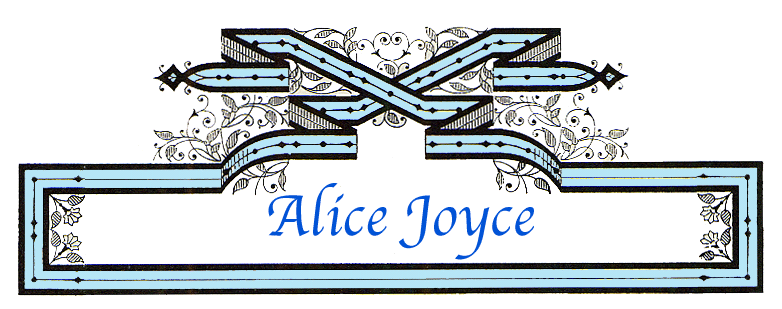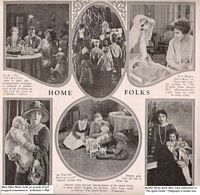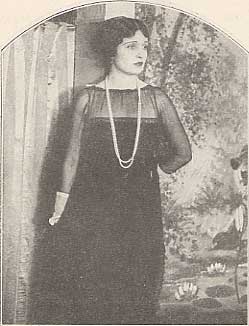

The Spark Divine (1919) Vitagraph Co. of America. Distributor: Vitagraph Co. of America. Director: Tom Terriss. Scenario: George Proctor. Story: Alicia Ramsey. Camera: Joe Shelderfer. Cast: Alice Joyce, William Carlton, Jr., Eulalie Jensen, Frank Norcross, Mary Carr. 5 reels This film appears to be LOST
 |
A page from the Dramatic Mirror of July 15, 1919. The inserts in the middle of the top row and bottom right are from this film. |
| Box Office Value | Great |
Exhibitor Comments: "Joyce means full houses." "Fine story."
NAT'L BOARD OF REVIEW REPORT
| Entertainment Value | Fair |
| Dramatic Interest | Sufficient |
| Technical Handling | Fair |
| Coherence of Narrative | Good |
| Acting | Good |
| Scenic Setting | Good |
| Photography | Good |
| Atmospheric Value | Fair |
| Quality as a picture | Fair |
WHAT IT IS
A regular icicle of a woman contracts a marriage with a man who adores her but for whom she feels no sentiment but that of contentment that he has plenty of this world's well known goods. Even the birth of her child does not kindle a human flame in her heart, but when her husband frames up a kidnapping and she feels what it is to be without her baby, the Spark Divine begins to glow.
"The Spark Divine."
Alice Joyce Star in Story of Woman's Cold Heart Kindled by Fire of Mother Love
Reviewed by William J. Reilly.
THERE have been many pictures made around the theme of mother love, but few with the imaginative power that surrounds the work of Vitagraph in Alice Joyce's latest feature, "The Spark Divine." Mother love in this case is not wasted on a worthless son or daughter. The Vitagraph feature, beginning at babyhood, traces the development of the woman portrayed by Alice Joyce into a woman of beauty and talent, yet a creature of ice, with no warmth of spirit, lacking every bit of affectionate fire. The picture forces her into a marriage for the purpose of averting a financial catastrophe in her family.
Even then, no love is engendered. Even after the child is born, there is no love in the woman's heart. Her repression of all signs and tokens of affection make the spectator gasp at her self-inflicted cruelty. The divine spark of mother love is not kindled until her husband has the child kidnapped. With the little lad's absence, the fire in her heart is vivified.
The titlings of the picture have unusually artistic backgrounds, and several unique continuity arrangements lend to the quality of the story. The work of Alice Joyce, directed by Tom Terriss, is finely in sympathy with the cold woman she portrays. Theme, star, and direction present a strong combination for exploitation in this picture.
Cast.| Marcia Van Arsdale | Alice Joyce |
| Robert Jardine | William Carlton, Jr. |
| Mrs. Van Arsdale | Eulalie Jensen |
| Mr. Van Arsdale | Frank Norcross |
| Mrs. Jardine | Mary Carr |
Directed by Tom Terriss.
Story by Alicia Ramsey.
Scenario by George Proctor.
The Story
Marcia Van Arsdale, in Vitagraph's "The Spark Divine," is a woman in whom every sentiment of affection and love has been choked since childhood. Her parents, striving for social recognition, forced the child into unnatural situations, and refused, for instance, to let her have her favorite doll, because it was too ragged for a daughter of theirs. The day of her graduation from college they have her brought home by their footmen.
Grown to womanhood, Marcia is beautiful and talented, but constant repression of every outward sign of affection has made her a thing of ice. Her father's money is threatened by the stock market activities of Robert Jardine, the young copper king, and at the urging of her parents, she consents to marry him. Jardine loves her and promises himself that under he cold exterior is a human, true heart.
He finds, however, that marriage with her meant little more than a household agreement. When a baby boy is born to them, Jardine finds that his wife is still cold and unnatural. Then, one day, the boy is kidnapped, and Marcia awakens to the fact that her heart is full of mother love. Search is fruitless. Christmas eve brings only sadness to the Jardine home, until Marcia discovers from her husband that he had the child kidnapped to kinder the spark in her bosom.
 |
Photo caption: "The Spark Divine" features Alice Joyce in a portrayal both sincere and interesting.
THE SPARK DIVINE--Vitagraph
That Alice Joyce is Vitagraph's star of stars is evident by the care they take in her productions, and their evident pains to procure for her sound, appealing and well-fitting stories. I cannot agree that "The Spark Divine" is a well-fitting or even an especially human or probably story, but it is nevertheless a tale which, as a combination of problem , narrative, argument and interpretation is worth an hour's observation. It is a creditable production, carefully and painstakingly made, and when producers are careful and painstaking--when they do the best they can, in other words, as Vitagraph seems to be doing with Alice Joyce--it behooves the commentary onlooker to be full of patience and encouragement. Here Miss Joyce is set to interpreting Marcia Jardine, a daughter of the new-rich Van Arsdales. The narrator goes well behind the scenes for her reasons, for she shows Marcia as a baby, Marcia growing up, and finally Marcia as the wife of Robert Jardine, a husband very convenient for the family's business reasons. The thesis would, perhaps, have worked out much more perfectly in a novel, for words would have shown less draggily than does the picture Marcia, in her artificial surroundings, losing all contact with and love for life, until she asks in a cold way concerning her new-born baby, "Must I touch it?" It is a kidnapping of this baby--arranged to produce an awakening--which does awaken the mother love and unleash the warm blood in Marcia's veins. The few dramatic episodes are well handled, and Miss Joyce gives as sincere and interesting a portrayal of Marcia as you could well imagine, but, as I have said, it is not a pre-eminently good screen story. William Carlton, Jr., plays Jardine, the young husband. Tom Terriss directed.
Last revised August 11, 2009